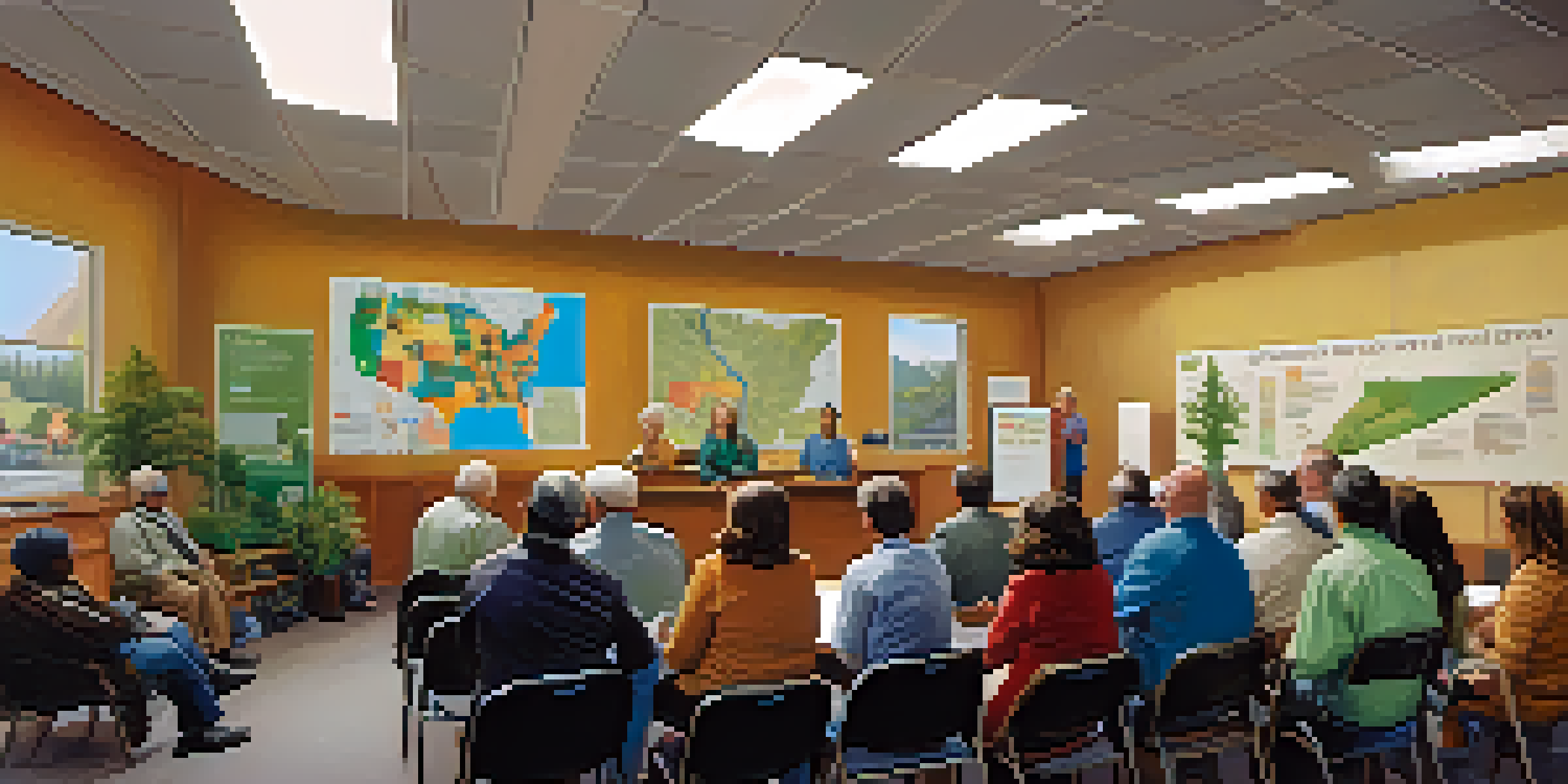Impact of Local Governments on Washington State Policies

Understanding Local Government Structure in Washington State
Washington State has a diverse array of local governments, including counties, cities, and towns, each with its own set of powers and responsibilities. These entities serve as the closest level of governance to the people, allowing for more tailored approaches to policy-making. For instance, a small town may prioritize agriculture policies, while a bustling city may focus on transportation and housing. This structure fosters a unique environment where local needs can be more effectively addressed.
Local government is the closest government to the people, and it is where citizens can have the most influence over the policies that affect their daily lives.
Local governments operate under the framework of state law, but they have the authority to create ordinances that reflect the unique needs of their communities. This means they can implement policies that differ significantly from neighboring jurisdictions, promoting a sense of local identity and self-governance. An example of this can be seen in the varying regulations on land use and zoning, which can greatly influence community development and growth.
Additionally, local governments often engage directly with their constituents, gathering feedback and adjusting policies accordingly. This grassroots approach not only enhances civic engagement but also ensures that policies are more relevant and effective. By understanding the local context, these governments can make informed decisions that resonate with the values and needs of their communities.
The Role of Local Governments in Policy Implementation
Local governments play a crucial role in implementing state policies, acting as the bridge between state directives and community needs. For example, when the state mandates a new environmental regulation, it's often up to local agencies to enforce these rules and adapt them as necessary. This can involve anything from setting up local recycling programs to ensuring compliance with water quality standards.

In Washington State, local governments often tailor state policies to better fit the unique challenges they face. This is particularly evident in areas like public health, where local health departments create initiatives that address community-specific issues, such as vaccination drives or mental health awareness programs. Such adaptations are essential for ensuring that state policies have a meaningful impact on the ground.
Community Engagement Drives Success
Active community engagement in local policy-making enhances transparency and builds trust between citizens and their governments.
Moreover, local governments can be more agile in responding to emerging issues. For instance, during the COVID-19 pandemic, local leaders quickly implemented health and safety measures tailored to their communities’ needs. This responsiveness highlights the importance of local governance in effectively addressing urgent matters and implementing state policies in a timely manner.
Local Governments as Innovators in Policy Development
Local governments often act as laboratories for policy innovation, experimenting with new ideas that can later be adopted at the state level. This is particularly significant in areas like sustainable development and affordable housing, where local initiatives can serve as models for broader application. For instance, a city may trial a new public transportation system that, if successful, could inspire similar efforts statewide.
The best way to predict the future is to create it.
The flexibility of local governance allows for more creative and diverse solutions to complex problems. A great example is the various approaches seen in different cities regarding homelessness. Some local governments have implemented innovative housing-first strategies, while others focus on comprehensive support services, each reflecting their unique community dynamics.
Additionally, success stories at the local level can influence state policies, showing lawmakers effective practices that work in real-world scenarios. This can lead to the adoption of more progressive or effective state-wide policies based on proven local initiatives, ultimately benefiting the entire state.
Community Engagement and the Local Policy Process
Community engagement is a cornerstone of local government policy-making in Washington State. Local officials often hold town hall meetings, surveys, and workshops to gather input from residents, ensuring that policies are reflective of community needs. This participatory approach not only fosters transparency but also builds trust between citizens and their local governments.
Engaged communities are more likely to support and comply with local policies because they feel a sense of ownership in the decision-making process. For instance, when residents are involved in planning decisions for new parks or infrastructure projects, they are more likely to advocate for and utilize these resources. This engagement leads to policies that are more aligned with the desires and needs of the community.
Local Governance and Community Needs
Local governments in Washington State tailor policies to meet unique community needs, fostering local identity and self-governance.
Moreover, local governments can leverage technology to enhance community engagement. Online platforms allow residents to voice their opinions and stay informed about local issues, making it easier for diverse populations to participate. This tech-driven approach not only broadens participation but also ensures that policies are developed with a comprehensive understanding of community perspectives.
The Influence of Local Governments on Education Policies
Local governments significantly influence education policies within their jurisdictions, often working closely with school districts to address local educational needs. This can include funding allocation, curriculum development, and the establishment of educational programs that cater to the community's unique demographic. For example, a local government may prioritize STEM education initiatives to better prepare students for future job markets.
Additionally, local governments can advocate for policies that address educational disparities, such as funding for under-resourced schools. By identifying specific community needs, local officials can push for state funding or develop programs that support equitable education for all students. This grassroots advocacy is essential in creating a more inclusive educational landscape.
Local governments also contribute to the overall educational environment by supporting initiatives that promote community involvement in schools. For instance, partnerships between local businesses and schools can foster internship opportunities and mentorship programs, enhancing students' educational experiences. Such collaborations highlight the important role local governance plays in shaping a well-rounded educational framework.
Economic Development Initiatives by Local Governments
Economic development is a key focus for local governments in Washington State, as they seek to create jobs and stimulate growth in their communities. Local officials often implement policies that attract businesses, such as tax incentives or streamlined permitting processes. These initiatives not only encourage new investments but also foster a vibrant local economy.
Moreover, local governments can tailor their economic development strategies to address specific community strengths and challenges. For instance, a coastal city may focus on promoting tourism and fishing industries, while an inland community may prioritize agriculture or manufacturing. This localized approach ensures that economic policies are relevant and beneficial to residents.
Innovation in Local Policy Development
Local governments serve as testing grounds for innovative policies that can later influence state-wide initiatives.
Additionally, local governments often collaborate with regional organizations and businesses to develop comprehensive economic plans. These partnerships can lead to innovative projects that boost job creation and enhance community infrastructure. By working together, local governments can ensure that their economic policies reflect the collective vision and aspirations of their communities.
The Future of Local Governance and Policy Impact
As Washington State continues to evolve, the role of local governments in shaping policies will likely expand. With increasing challenges such as climate change, housing shortages, and social equity issues, local leaders are positioned to respond rapidly and effectively. Their close connection to the community enables them to address these concerns in a way that resonates with residents.
Looking ahead, local governments may need to embrace more collaborative approaches, working alongside state authorities and community organizations to tackle complex issues. This could involve creating joint task forces that unite various stakeholders to develop comprehensive solutions. By fostering collaboration, local governments can amplify their impact and enhance the effectiveness of state policies.

Ultimately, the future of local governance in Washington State will depend on the continued engagement of citizens and the adaptability of local leaders. As communities grow and change, local governments must remain vigilant and responsive, ensuring that their policies align with the needs and aspirations of the people they serve.